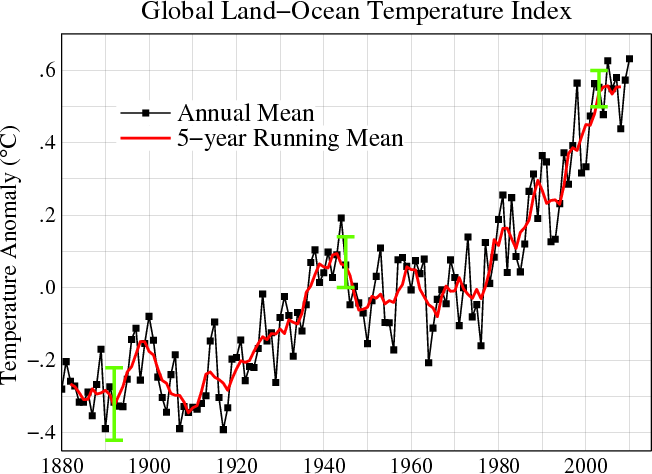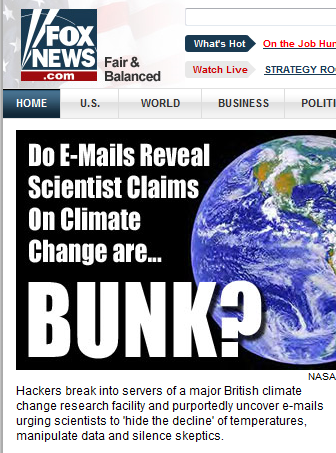NOTE: This post will be continually updated to cover things like the NYT’s misdirected (front page!) reporting.
As many of you will be aware, a large number of emails from the University of East Anglia webmail server were hacked recently (Despite some confusion generated by Anthony Watts, this has absolutely nothing to do with the Hadley Centre which is a completely separate institution).
So begins the RealClimate post on this hack-heard-round-the-blogosphere. At the end, I’ll excerpt that post, which makes clear this is much ado about not bloody much. I’ll also look at the
The predictable FoxNews take is here (screen capture of their front page is above). At the end, I’ll post some truly amazing quotes from the anti-scientific side of the blogosphere, from Brad Johnson’s Wonk Room post, including this from the Telegraph’s James Delingpole:
If you own any shares in alternative energy companies I should start dumping them NOW.
Whatever smoke the anti-scientific disinformers are able to blow into people’s faces over this bunch of emails dating back over a decade, it doesn’t change the basic facts about human-caused warming:

- Very warm 2008 makes this the hottest decade in recorded history by far
- World’s Glaciers Shrink for 18th Year
- Skeptical Science explains how we know global warming is happening: It’s the oceans, stupid!
Figure: Time series of global mean heat storage (0–2000 m), measured in 108 Jm-2.
The NYT’s Revkin has a piece whose headline and lede, typically, misses the entire point, “Hacked E-Mails Fuel Climate Change Skeptics.” Note to Andy: Everything fuels the disinformers! And that includes studies and data that prove the exact opposite of what they assert.
Who cares that, as Revkin says in his opening (!) sentence, this is “causing a stir among global warming skeptics, who say they show that climate scientists conspired to overstate the case for a human influence on climate change”? This was a chance for Revkin to make up for his misinformation-filled post from September [see “NYT’s Revkin pushes global cooling myth (again!) and repeats outright misinformation“]. Even his most science-based sentence is hedged: “But the evidence pointing to a growing human contribution to global warming is so broad and deep that the hacked material is unlikely to erode the overall argument.” Unlikely? Ya think?
Revkin asserts in the so-called paper of record that “some of the comments might lend themselves to sinister interpretations.” So is this a news story or just a speculative opinion piece? Instead of saying what interpretation might be possible, why not actually talk to the authors of the emails and other scientists and report what they emails actually were meant to communicate? Oh, wait, later in the piece he notes “But several scientists whose names appear repeatedly in the e-mails said they merely revealed that scientists are human beings, and did nothing to undercut the body of research on global warming.” Duh.
I do appreciate that Revkin reported this blockbuster news in the third paragraph:
In another [email], a scientist refers to climate skeptics as “idiots.”
Stop the presses!
The fact that a crime was committed is buried in the story — Scholars and Rogues has a genuine analysis of that important fact and its implications, which Revkin basically glosses over. It is worthwhile to note at this point that the University “could not confirm that all the material circulating on the Internet was authentic.” Again, duh.
The fact that this misdirected NYT story was on the front page just compounds the miscoverage. The Washington Post story is on page A14, with this vastly superior headline and subhead: “Hackers steal electronic data from top climate research center: Scientists’ e-mails deriding skeptics of warming become public.”
Here’s most of the rest of the post from the scientists at RealClimate, which is still the most thoughtful thing I have seen written on the subject:
As people are also no doubt aware the breaking into of computers and releasing private information is illegal, and regardless of how they were obtained, posting private correspondence without permission is unethical. We therefore aren’t going to post any of the emails here. We were made aware of the existence of this archive last Tuesday morning when the hackers attempted to upload it to RealClimate, and we notified CRU of their possible security breach later that day.Nonetheless, these emails (a presumably careful selection of (possibly edited?) correspondence dating back to 1996 and as recently as Nov 12) are being widely circulated, and therefore require some comment. Some of them involve people here (and the archive includes the first RealClimate email we ever sent out to colleagues) and include discussions we’ve had with the CRU folk on topics related to the surface temperature record and some paleo-related issues, mainly to ensure that pos
ting were accurate.Since emails are normally intended to be private, people writing them are, shall we say, somewhat freer in expressing themselves than they would in a public statement. For instance, we are sure it comes as no shock to know that many scientists do not hold Steve McIntyre in high regard. Nor that a large group of them thought that the Soon and Baliunas (2003), Douglass et al (2008) or McClean et al (2009) papers were not very good (to say the least) and should not have been published. These sentiments have been made abundantly clear in the literature (though possibly less bluntly).
More interesting is what is not contained in the emails. There is no evidence of any worldwide conspiracy, no mention of George Soros nefariously funding climate research, no grand plan to ‘get rid of the MWP’, no admission that global warming is a hoax, no evidence of the falsifying of data, and no ‘marching orders’ from our socialist/communist/vegetarian overlords. The truly paranoid will put this down to the hackers also being in on the plot though.
Instead, there is a peek into how scientists actually interact and the conflicts show that the community is a far cry from the monolith that is sometimes imagined. People working constructively to improve joint publications; scientists who are friendly and agree on many of the big picture issues, disagreeing at times about details and engaging in ‘robust’ discussions; Scientists expressing frustration at the misrepresentation of their work in politicized arenas and complaining when media reports get it wrong; Scientists resenting the time they have to take out of their research to deal with over-hyped nonsense. None of this should be shocking.
It’s obvious that the noise-generating components of the blogosphere will generate a lot of noise about this. but it’s important to remember that science doesn’t work because people are polite at all times. Gravity isn’t a useful theory because Newton was a nice person. QED isn’t powerful because Feynman was respectful of other people around him. Science works because different groups go about trying to find the best approximations of the truth, and are generally very competitive about that. That the same scientists can still all agree on the wording of an IPCC chapter for instance is thus even more remarkable.
No doubt, instances of cherry-picked and poorly-worded “gotcha” phrases will be pulled out of context. One example is worth mentioning quickly. Phil Jones in discussing the presentation of temperature reconstructions stated that “I’ve just completed Mike’s Nature trick of adding in the real temps to each series for the last 20 years (ie from 1981 onwards) and from 1961 for Keith’s to hide the decline.” The paper in question is the Mann, Bradley and Hughes (1998) Nature paper on the original multiproxy temperature reconstruction, and the ‘trick’ is just to plot the instrumental records along with reconstruction so that the context of the recent warming is clear. Scientists often use the term “trick” to refer to a “a good way to deal with a problem”, rather than something that is “secret”, and so there is nothing problematic in this at all. As for the ‘decline’, it is well known that Keith Briffa’s maximum latewood tree ring density proxy diverges from the temperature records after 1960 (this is more commonly known as the “divergence problem”–see e.g. the recent discussion in this paper) and has been discussed in the literature since Briffa et al in Nature in 1998 (Nature, 391, 678-682). Those authors have always recommend not using the post 1960 part of their reconstruction, and so while ‘hiding’ is probably a poor choice of words (since it is ‘hidden’ in plain sight), not using the data in the plot is completely appropriate, as is further research to understand why this happens.
The timing of this particular episode is probably not coincidental. But if cherry-picked out-of-context phrases from stolen personal emails is the only response to the weight of the scientific evidence for the human influence on climate change, then there probably isn’t much to it.
There are of course lessons to be learned. Clearly no-one would have gone to this trouble if the academic object of study was the mating habits of European butterflies. That community’s internal discussions are probably safe from the public eye. But it is important to remember that emails do seem to exist forever, and that there is always a chance that they will be inadvertently released. Most people do not act as if this is true, but they probably should.
It is tempting to point fingers and declare that people should not have been so open with their thoughts, but who amongst us would really be happy to have all of their email made public?
If you want some specific explanations for some of the other e-mails that have been getting the most attention, Gavin Schmidt has been doing yeoman’s work in the comments at Real Climate. Just search for “gavin,” and you will find his various responses. Gavin is asked, “Is Dr Trenberth correct in his claim that we can’t explain why the planet hasn’t been warming as expected?”
Here is a longer discussion of the email by NCAR’s Kevin Trenberth on “where the heck is global warming?”
Brad Johnson from Wonk Room notes the disinformers are “sifting through the illegally obtained letters of private correspondence for “proof” that the scientific consensus on climate change is actually a global conspiracy“:
– Hot Air’s Ed Morrissey claims the emails discuss “repetitive, false data of higher temperatures.”
– The National Review’s Chris Horner salivates, “The blue-dress moment may have arrived.”
– “The crimes revealed in the e-mails promise to be the global warming scandal of the century,” blares Michelle Malkin.
– The Australia Herald-Sun’s Andrew Bolt claims the emails are “proof of a conspiracy which is one of the largest, most extraordinary and most disgraceful in moderrn [sic] science.”
The UK media reports that the official University of East Anglia reply as of Friday afternoon is:
“We are
aware that information from a server used for research information in one area of the university has been made available on public websites,” said the spokesperson in a statement. “Because of the volume of this information we cannot currently confirm that all of this material is genuine.”“This information has been obtained and published without our permission and we took immediate action to remove the server in question from operation,” the spokesperson continued.
“We are undertaking a thorough internal investigation and we have involved the police in this enquiry.”
Related Post:





